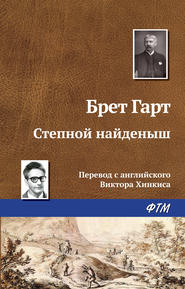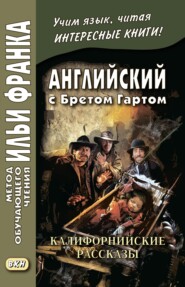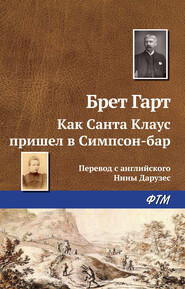По всем вопросам обращайтесь на: info@litportal.ru
(©) 2003-2025.
✖
Gabriel Conroy
Автор
Год написания книги
2017
Настройки чтения
Размер шрифта
Высота строк
Поля
IN WHICH THE FOOTPRINTS RETURN
Mr. Jack Hamlin was in very bad case. When Dr. Duchesne, who had been summoned from Sacramento, arrived, that eminent surgeon had instantly assumed such light-heartedness and levity toward his patient, such captiousness toward Pete, with an occasional seriousness of demeanour when he was alone, that, to those who knew him, it was equal to an unfavourable prognosis. Indeed, he evaded the direct questioning of Olly, who had lately constituted herself a wondrously light-footed, soft-handed assistant of Pete, until one day, when they were alone, he asked more seriously than was his wont if Mr. Hamlin had ever spoken of his relations, or if she knew of any of his friends who were accessible.
Olly had already turned this subject over in her womanly mind, and had thought once or twice of writing to the Blue Moselle, but on the direct questioning of the doctor, and its peculiar significance, she recalled Jack's confidences on their midnight ride, and the Spanish beauty he had outlined; and so one evening, when she was alone with her patient, and the fever was low, and Jack lay ominously patient and submissive, she began – what the doctor had only lately abandoned – probing a half-healed wound.
"I reckon you'd hev been a heap more comfortable ef this thing hed happened to ye down thar in San Antonio," said Olly.
Jack rolled his dark eyes wonderingly upon his fair persecutor.
"You know you'd hev had thet thar sweetheart o' yours – thet Mexican woman – sittin' by ye, instead o' me – and Pete," suggested the artful Olympia.
Jack nearly leaped from the bed.
"Do you reckon I'd hev rung myself in as a wandering cripple – a tramp thet hed got peppered – on a lady like her? Look yer, Olly," continued Mr. Hamlin, raising himself on his elbow, "if you've got the idea thet thet woman is one of them hospital sharps – one of them angels who waltz round a sick man with a bottle of camphor in one hand and a tract in the other – you had better disabuse your mind of it at once, Miss Conroy; take a back seat and wait for a new deal. And don't you go to talkin' of thet lady as my sweetheart – it's – it's – sacrilegious – and the meanest kind of a bluff."
As the day of the trial drew near, Mr. Hamlin had expressed but little interest in it, and had evidently only withheld his general disgust of Gabriel's weakness from consideration of his sister. Once Mr. Hamlin condescended to explain his apparent coldness.
"There's a witness coming, Olly, that'll clear your brother – more shame for him – the man ez did kill Ramirez. I'm keeping my sympathies for that chap. Don't you be alarmed. If that man don't come up to the scratch I will. So – don't you go whining round. And ef you'll take my advice, you'll keep clear o' that Court, and let them lawyers fight it out. It will be time enough for you to go when they send for me."
"But you can't move – you ain't strong enough," said Olly.
"I reckon Pete will get me there some way, if he has to pack me on his back. I ain't a heavy weight now," said Jack, looking sadly at his thin white hands; "I've reckoned on that, and even if I should pass in my checks, there's an affidavit already sworn to in Maxwell's hands."
Nevertheless, on the day of the trial, Olly, still doubtful of Gabriel, and still mindful of his capacity to develop "God-forsaken mulishness," was nervous and uneasy, until a messenger arrived from Maxwell with a note to Hamlin, carrying the tidings of the appearance of Perkins in Court, and closing with a request for Olly's presence.
"Who's Perkins?" asked Olly, as she reached for her hat in nervous excitement.
"He's no slouch," said Jack, sententiously. "Don't ask questions. It's all right with Gabriel now," he added, assuringly. "He's as good as clear. Run away, Miss Conroy. Hold up a minit! There, kiss me! Look here, Olly, say! – do you take any stock in that lost sister of yours that your fool of a brother is always gabbing about? You do? Well, you are as big a fool as he. There! There! – never mind now – she's turned up at last! Much good may it do you. One! two! – go!" and as Olly's pink ribbons flashed through the doorway, Mr. Hamlin lay down again with a twinkle in his eye.
He was alone. The house was very quiet and still; most of the guests, and the hostess and her assistant, were at the all-absorbing trial; even the faithful Pete, unconscious of any possible defection of his assistant, Olly, had taken the opportunity to steal away to hear the arguments of counsel. As the retreating footsteps of Olly echoed along the vacant corridor, he felt that he possessed the house completely.
This consciousness to a naturally active man, bored by illness and the continuous presence of attendants, however kind and devoted, was at first a relief. Mr. Hamlin experienced an instant desire to get up and dress himself, to do various things which were forbidden – but which now an overruling Providence had apparently placed within his reach. He rose with great difficulty, and a physical weakness that seemed altogether inconsistent with the excitement he was then feeling, and partially dressed himself. Then he was suddenly overtaken with great faintness and vertigo, and struggling to the open window, fell in a chair beside it. The cool breeze revived him for a moment, and he tried to rise, but found it impossible. Then the faintness and vertigo returned, and he seemed to be slipping away somewhere – not altogether unpleasantly, nor against his volition – somewhere where there was darkness and stillness and rest. And then he slipped back, almost instantly as it seemed to him, to a room full of excited and anxious people, all extravagantly, and as he thought, ridiculously concerned about himself. He tried to assure them that he was all right, and not feeling any worse for his exertion, but was unable to make them understand him. Then followed Night, replete with pain, and filled with familiar voices that spoke unintelligibly, and then Day, devoted to the monotonous repetition of the last word or phrase that the doctor, or Pete, or Olly had used, or the endless procession of Olly's pink ribbons, and the tremulousness of a window curtain, or the black, sphinx-like riddle of a pattern on the bed-quilt or the wall-paper. Then there was sleep that was turbulent and conscious, and wakefulness that was lethargic and dim, and then infinite weariness, and then lapses of utter vacuity – the occasional ominous impinging of the shadow of death.
But through this chaos there was always a dominant central figure – a figure partly a memory, and, as such, surrounded by consistent associations; partly a reality and incongruous with its surroundings – the figure of Donna Dolores! But whether this figure came back to Mr. Hamlin out of the dusky arches of the Mission Church in a cloud of incense, besprinkling him with holy water, or whether it bent over him, touching his feverish lips with cool drinks, or smoothing his pillow, a fact utterly unreal and preposterous seen against the pattern of the wall-paper, or sitting on the familiar chair by his bedside – it was always there. And when, one day, the figure stayed longer, and the interval of complete consciousness seemed more protracted, Mr. Hamlin, with one mighty effort, moved his lips, and said feebly —
"Donna Dolores!"
The figure started, leaned its beautiful face, blushing a celestial rosy red, above his own, put its finger to its perfect lips, and said in plain English —
"Hush! I am Gabriel Conroy's sister."
CHAPTER IX.
IN WHICH MR. HAMLIN PASSES
With his lips sealed by the positive mandate of the lovely spectre, Mr. Hamlin resigned himself again to weakness and sleep. When he awoke, Olly was sitting by his bedside; the dusky figure of Pete, spectacled and reading a good book, was dimly outlined against the window – but that was all. The vision – if vision it was – had fled.
"Olly," said Mr. Hamlin, faintly.
"Yes!" said Olly, opening her eyes in expectant sympathy.
"How long have I been dr – I mean how long has this – spell lasted?"
"Three days," said Olly.
"The – you say!" (A humane and possibly weak consideration for Mr. Hamlin in his new weakness and suffering restricts me to a mere outline of his extravagance of speech.)
"But you're better now," supplemented Olly.
Mr. Hamlin began to wonder faintly if his painful experience of the last twenty-four hours were a part of his convalsecence. He was silent for a few moments and then suddenly turned his face toward Olly.
"Didn't you say something about – about – your sister, the other day?"
"Yes – she's got back," said Olly, curtly.
"Here?"
"Here."
"Well?" said Mr. Hamlin, a little impatiently.
"Well," returned Olly, with a slight toss of her curls, "she's got back and I reckon it's about time she did."
Strange to say, Olly's evident lack of appreciation of her sister seemed to please Mr. Hamlin – possibly because it agreed with his own idea of Grace's superiority and his inability to recognise or accept her as the sister of Gabriel.
"Where has she been all this while?" asked Jack, rolling his large hollow eyes over Olly.
"Goodness knows! Says she's bin livin' in some fammerly down in the South – Spanish, I reckon; thet's whar she gits those airs and graces."
"Has she ever been here – in this room?" asked Mr. Hamlin.
"Of course she has," said Olly. "When I left you to go with Gabe to see his wife at Wingdam, she volunteered to take my place. Thet waz while you waz flighty, Mr. Hamlin. But I reckon she admired to stay here on account of seein' her bo!"
"Her what?" asked Mr. Hamlin, feeling the blood fast rushing to his colourless face.
"Her bo," repeated Olly, "thet thar Ashley, or Poinsett – or whatever he calls hisself now!"
Mr. Hamlin here looked so singular, and his hand tightened so strongly around Olly's, that she hurriedly repeated to him the story of Grace's early wanderings, and her absorbing passion for their former associate, Arthur Poinsett. The statement was, in Olly's present state of mind, not favourable to Grace. "And she just came up yer only to see Arthur agin. Thet's all. And she nearly swearin' her brother's life away – and pretendin' it was only done to save the fammerly name. Jest ez if it hed been any more comfortable fur Gabriel to have been hung in his own name. And then goin' and accusin' thet innocent ole lamb, Gabe, of conspiring with July to take her name away. Purty goin's on, I reckon. And thet man Poinsett, by her own showin' – never lettin' on to see her nor us – nor anybody. And she sassin' me for givin' my opinion of him – and excusin' him by sayin' she didn't want him to know whar she was. And she refusin' to see July at all – and pore July lyin' thar at Wingdam, sick with a new baby. Don't talk to me about her!"
"But your sister didn't run away with – with – this chap. She went away to bring you help," interrupted Jack, hastily dragging Olly back to earlier history.
"Did she? Couldn't she trust her bo to go and get help and then come back fur her? – reckonin' he cared for her at all. No, she waz thet crazy after him she couldn't trust him outer her sight – and she left the camp and Gabe and ME for him. And then the idee of her talking to Gabriel about bein' disgraced by July. Ez ef she had never done anythin' to spile her own name, and puttin' on such airs and" —
"Dry up!" shouted Mr. Hamlin, turning with sudden savageness upon his pillow. "Dry up! – don't you see you're driving me half-crazy with your infernal buzzing?" He paused, as Olly stopped in mingled mortification and alarm, and then added in milder tones, "There, that'll do. I am not feeling well to-day. Send Dr. Duchesne to me if he's here. Stop one moment – there! good-bye, go!"
Olly had risen promptly. There was always something in Mr. Hamlin's positive tones that commanded an obedience that she would have refused to any other. Thoroughly convinced of some important change in Mr. Hamlin's symptoms, she sought the doctor at once. Perhaps she brought with her some of her alarm and anxiety, for a moment later that distinguished physician entered with less deliberation than was his habit. He walked to the bedside of his patient, and would have taken his hand, but Jack slipped his tell-tale pulse under the covers, and looking fixedly at the doctor, said —
"Can I be moved from here?"

















